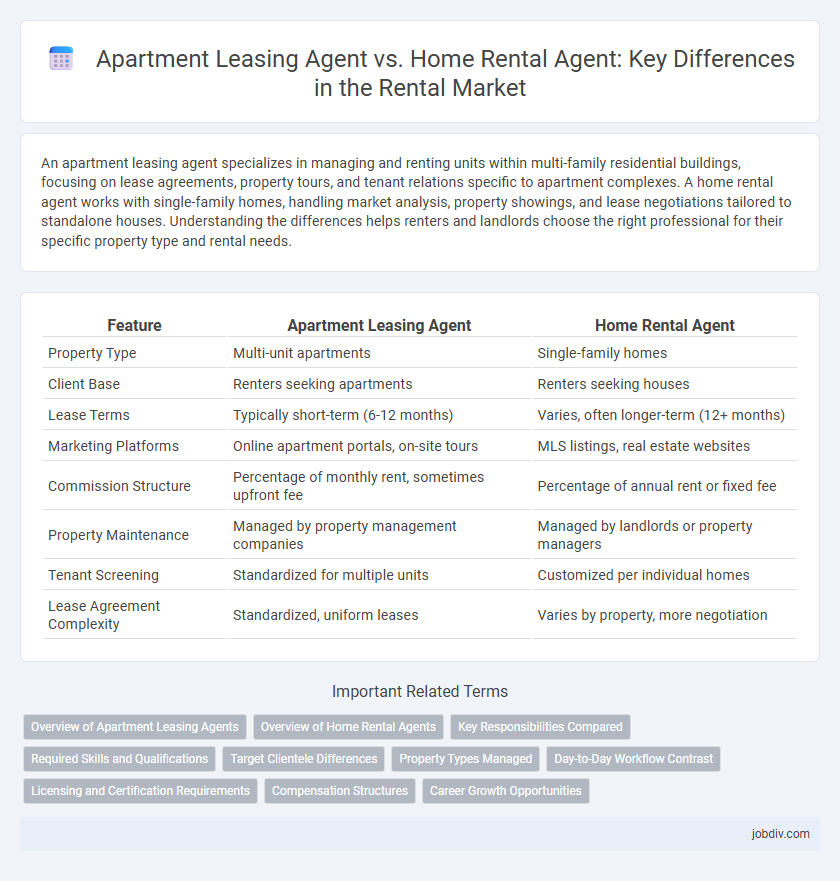An apartment leasing agent specializes in managing and renting units within multi-family residential buildings, focusing on lease agreements, property tours, and tenant relations specific to apartment complexes. A home rental agent works with single-family homes, handling market analysis, property showings, and lease negotiations tailored to standalone houses. Understanding the differences helps renters and landlords choose the right professional for their specific property type and rental needs.
Table of Comparison
| Feature | Apartment Leasing Agent | Home Rental Agent |
|---|---|---|
| Property Type | Multi-unit apartments | Single-family homes |
| Client Base | Renters seeking apartments | Renters seeking houses |
| Lease Terms | Typically short-term (6-12 months) | Varies, often longer-term (12+ months) |
| Marketing Platforms | Online apartment portals, on-site tours | MLS listings, real estate websites |
| Commission Structure | Percentage of monthly rent, sometimes upfront fee | Percentage of annual rent or fixed fee |
| Property Maintenance | Managed by property management companies | Managed by landlords or property managers |
| Tenant Screening | Standardized for multiple units | Customized per individual homes |
| Lease Agreement Complexity | Standardized, uniform leases | Varies by property, more negotiation |
Overview of Apartment Leasing Agents
Apartment leasing agents specialize in managing rental agreements and tenant relations within multifamily residential buildings, ensuring efficient occupancy and lease compliance. They coordinate property showings, screen applicants, and handle lease documentation tailored to apartment complexes. Expertise in market trends and property management software enhances their ability to maximize rental income and maintain tenant satisfaction.
Overview of Home Rental Agents
Home rental agents specialize in managing leasing processes for residential properties, coordinating tenant screenings, lease agreements, and property showings to ensure smooth transactions. They possess in-depth knowledge of local rental markets, regulations, and tenant-landlord laws, optimizing occupancy rates and rental income for property owners. Their expertise often includes marketing rental homes through various platforms and maintaining strong communication between landlords and tenants.
Key Responsibilities Compared
Apartment leasing agents primarily manage rental agreements, show model units, and handle tenant relations within large complexes, specializing in multi-unit properties. Home rental agents focus on marketing single-family homes, coordinating property maintenance, and negotiating lease terms tailored to individual households. Both roles require strong communication skills and knowledge of local rental laws but differ in scale and property types managed.
Required Skills and Qualifications
Apartment leasing agents require strong knowledge of multi-unit residential properties, excellent communication skills, and familiarity with property management software to efficiently handle high tenant turnover. Home rental agents need expertise in single-family home markets, negotiation skills tailored for longer lease terms, and understanding of local real estate laws and regulations. Both roles demand customer service abilities, attention to detail, and proficiency in rental application processing and credit screening.
Target Clientele Differences
Apartment leasing agents primarily target renters seeking multifamily units such as apartments and condominiums, often focusing on young professionals, students, or small families looking for short- to medium-term leases. Home rental agents cater to clients interested in single-family homes, attracting families or individuals desiring more space, privacy, and long-term rentals. The distinct target clientele shapes each agent's marketing strategies and property offerings to meet specific lifestyle preferences and leasing needs.
Property Types Managed
Apartment leasing agents specialize in managing multi-family residential properties such as apartment complexes and condominiums, efficiently handling tenant screening, lease agreements, and maintenance coordination. Home rental agents focus on single-family homes, townhouses, or duplexes, providing tailored services that address unique property needs and individual tenant relationships. Both roles require expertise in property marketing and legal compliance but differ primarily in the scope and scale of properties managed.
Day-to-Day Workflow Contrast
Apartment leasing agents manage multiple units within a single complex or community, focusing on coordinating showings, processing applications, and communicating building policies. Home rental agents handle diverse single-family properties, often engaging in personalized client interactions, property inspections, and neighborhood research. The apartment leasing workflow emphasizes volume and efficiency, whereas home rental agents prioritize individual client needs and property-specific details.
Licensing and Certification Requirements
Apartment leasing agents typically require state-specific real estate licenses, which involve pre-licensing courses and passing an exam, while home rental agents may also need similar licensing but sometimes operate under property management certifications depending on local regulations. Licensing ensures agents understand tenant laws, lease agreements, and property rules, which vary between apartment complexes and single-family home rentals. Certification programs like the Certified Apartment Leasing Professional (CALP) provide specialized skills for apartment leasing, whereas home rental agents might pursue broader property management credentials.
Compensation Structures
Apartment leasing agents typically earn a base salary combined with commissions based on the number of units leased, often receiving bonuses for meeting occupancy targets. Home rental agents usually work on a commission-only basis, earning a percentage of the monthly rent or a flat fee for each rental agreement secured. The compensation for apartment leasing agents tends to be more stable due to fixed salaries, while home rental agents experience variable income linked directly to rental turnover.
Career Growth Opportunities
Apartment leasing agents often experience faster career growth due to high turnover and numerous properties managed by large residential complexes, allowing them to develop specialized skills in tenant relations and property management. Home rental agents typically work with individual property owners, offering a more personalized approach but fewer opportunities for scaling their client base rapidly. Career advancement for apartment leasing agents frequently includes roles like property manager or regional leasing director, while home rental agents may progress toward independent real estate consulting or property investment roles.
Apartment Leasing Agent vs Home Rental Agent Infographic

 jobdiv.com
jobdiv.com